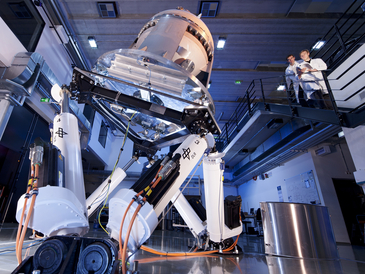Bremen is a major international location for aerospace technology. The University of Bremen and its partner institutes surrounding the campus enjoy high worldwide recognition in the area of aerospace research. And aerospace enterprises are constantly on the lookout for highly trained graduates in order to be competitive. In light of this, next winter semester the University of Bremen is launching two new postgraduate programs in the field of aerospace, both delivered in English: The international masters’ programs titled “Space Sciences and Technologies“ (Space-ST) and “Space Engineering” (SpE). Students on these programs will receive a sound cross-systems training qualifying them for careers in the aerospace industry or neighboring high-tech sectors as well as in research. The new programs are organized by the three University Faculties of Production Engineering, Mechanical Engineering & Process Engineering (Faculty 04), Physics/Electrical Engineering (Faculty 01) and Mathematics/Computer Science (Faculty 03) as well as the University’s Center of Applied Space Technology and Microgravity (ZARM) and the Institute of Space Systems belonging to the German Aerospace Center (DLR). Closing date for submitting applications is April 30 (Space-ST) or June 15 (SpE).
Master of Space Engineering (SpE)
The “Master of Space Engineering” (SpE) is an interdisciplinary study program offered by the Faculty of Production Engineering, Mechanical Engineering & Process Engineering (Faculty 04). Students enrolled on this program will learn how to design, realize and test complete space systems. Such systems include satellites, launchers, and payloads for space missions in the areas of space research, Earth observation, navigation, and telecommunication. Enrollment is possible every semester. Studies are strongly research-oriented and encompass the systems technologies required for applications in relevant space environments. Students acquire the skill sets necessary to develop innovative and interdisciplinary solutions for dealing with the constantly growing high-tech challenges in the area of space travel and adjacent fields.
Master of Space Science and Technologies (Space-ST)
The Faculty of Physics/Electrical Engineering (Faculty 01) is offering the “Master of Space Science and Technologies” (Space-ST). This interdisciplinary study program focuses on Earth observation by means of satellite systems. As a rule, studies comprise three main elements: Gathering data (sensing), analyzing data (processing) and the transmission of data back to Earth (communication). Students enrolled in this four-semester English-taught master’s program learn theoretical knowledge and gain hands-on experience in the frame of laboratory practicals. In the area of electives, they choose between courses and modules on environmental physics, electrical engineering and information technology, production engineering and Mathematics/Computer Science. During the research phase, students gain in-depth insights into areas of the practice such as physics for Earth observation or information technologies for aerospace applications and are offered opportunities to work on solving concrete problems in the areas of Earth observation and space travel.
If you would like to have more information on this topic, please contact:
University of Bremen
Master of Space Engineering (SpE)
Faculty of Production Engineering, Mechanical Engineering& Process Engineering (FB 04) ZARM – Center of Applied Space Technology and Microgravity
Maria Petrogiannis
email: space-engineeringprotect me ?!uni-bremenprotect me ?!.de
Master of Space Science and Technologies (Space-ST)
Faculty of Physics/Electrical Engineering
Prof.Dr.-Ing.SteffenPaul
PD. Dr. Annette Ladstätter-Weißenmayer
email: space-stprotect me ?!uni-bremenprotect me ?!.de

